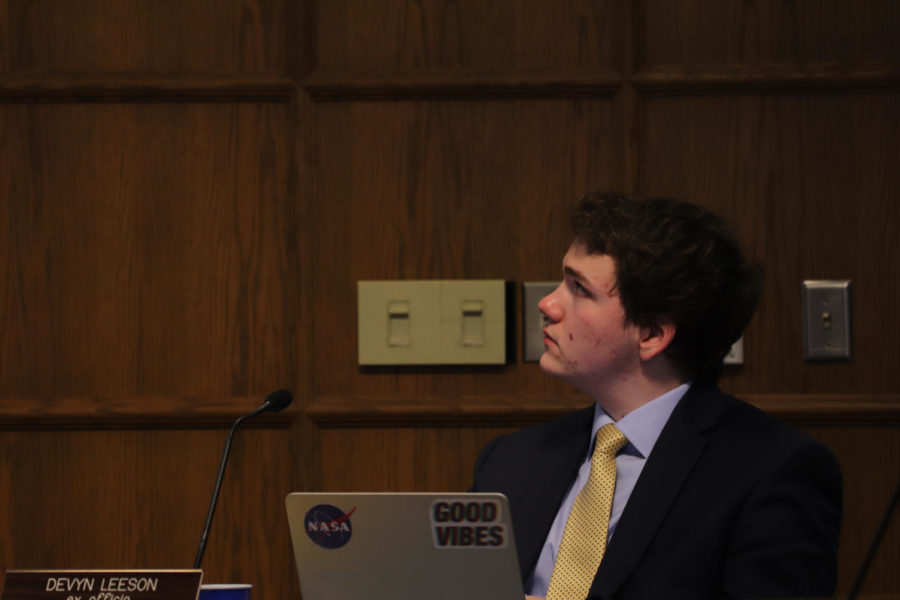Editorial: City Council should value tenant experiences
Ex-Officio Devyn Leeson at an Ames City Council meeting June 18, 2019. Leeson proposed a list of nine policy ideas for the Council to look into regarding landlord-tenant relations.
June 21, 2019
Earlier this week, Ex Officio Ames City Council Liaison Devyn Leeson sent an email to members of the council and Mayor John Haila outlining nine issues he found with the state of landlord-tenant relations in Ames, based on discussions with tenants, activists and student leaders.
The list included issues with accessibility, health and safety, the lease gap, transparency regarding average utility costs, closing loopholes that allow landlords to take advantage of students, rent abatement, the right to legal counsel for housing, requiring more information be attached to leases and eviction notices and requiring “proof of non-refundable fees” for things such as carpet cleaning at the end of a lease.
Haila’s initial reaction was, to say the least, disheartening.
In an email responding to Leeson, Haila asked him to “refrain from bringing any landlord/tenant type of topics up” at the council’s weekly meeting and repeatedly asserted that the city had no “standing” on these issues.
Near the end of his email, Haila asked Leeson why the city would “undertake any conversation where the landlords will become really upset and again take action at the statehouse.”
Haila’s concern stems from the state’s recent ban on municipal rental caps, which led the council to repeal its rental cap passed in May 2018.
However, Leeson offered many reasons within his original email.
In a point about accessibility, Leeson told the story of an Ames resident who uses a wheelchair. Last month, the elevator stopped working in the resident’s apartment building. For a week, he was forced to crawl up and down three flights of stairs, sometimes with his wheelchair, any time he wanted to leave his apartment.
That’s why.
In a point about health hazards, Leeson spoke of a “bat infestation” that a landlord refused to take care of for a tenant. The tenant eventually had to pay for a rabies shot.
That’s why.
It is not the belief of the ISD Editorial Board that the city is without compassion. In its Tuesday night discussion, the council voted unanimously to refer Leeson’s email to the Campus and Community Commission, which has already been examining tenant-landlord relationships in Ames, including the lease gap.
Rather, it seems the council feels trapped by the Legislature and intimidated by landlords.
This, however, does not ever justify a “why bother?” attitude. Residents such as those referenced in Leeson’s email depend on the councilmembers to act as public servants.
The idea of rent abatement, which would allow tenants to stop paying rent under certain circumstances, came up before Leeson addressed it in council comments. Iowa City adopted such an ordinance in 2017, and during its Tuesday meeting, the council directed city staff to draft one for Ames in cases of unregistered rentals and serious non-compliance with housing codes.
Even if Haila is entirely correct regarding the council’s ability to legislate on the other issues, it is still the duty of the council to acknowledge its constituents’ concerns. This can be done through other avenues, such as education and outreach, which At-Large Representative Bronwyn Beatty-Hansen mentioned during the meeting.
In discussing the issue of mold, which Leeson brought up under his health hazards point, the city does offer some recourse. Section 13.302.9 of the Ames Housing Code designates maintaining a “sanitary condition” as the property owner’s responsibility. However, mold is not specifically mentioned, and Leeson said landlords often blame tenants for the issue and refuse to fix it with such confidence that tenants will believe it.
While language could be added naming mold as an example of something unsanitary, Beatty-Hansen’s suggestion to reach out to and educate residents on their existing rights is an excellent example of a way the council could address these concerns.
Regarding housing accessibility, Leeson suggested finding a way to help tenants with disabilities afford housing with ramps and elevators or ground-floor units — another example of a way these issues can be addressed without direct legislation.
Regardless of whether or not these issues can be solved with legislation, it’s important that they are addressed.
It’s also important to note that it would be inappropriate for this to be relegated to being a student issue. In his email response to Leeson, Haila described the issues as a “students plight,” but these things certainly affect the greater community.
According to census data, only 39.3% of homes in Ames are owner-occupied, meaning that most homes in Ames are being rented — and not only to students.
Accessibility, health and any other concerns about tenants’ rights should be taken seriously by the city. Even if it is the city’s belief that Ames landlords will go to the Iowa Legislature to overturn their work, the City Council’s responsibility is to all of its constituents, many of whom are renters.







